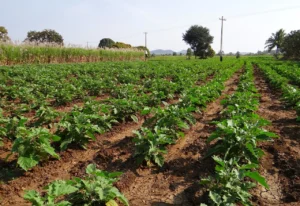In recent years, organic farming has witnessed a remarkable surge in popularity across India. This can be attributed to a growing consciousness about health, environmental sustainability, and evolving consumer preferences. Notably, the demand for high-value organic vegetables in the Indian market has been on the rise. This blog delves into the nuances of profitable organic farming, shedding light on the cultivation of high-value vegetables and their potential in the thriving Indian market.
The Rise of Organic Farming in India
The landscape of agriculture in India is experiencing a transformative shift, with organic farming gaining significant ground. A combination of factors, including health concerns associated with chemical-laden produce, an increased understanding of environmental impacts, and changing consumer preferences, has fueled this growth. According to recent statistics, the organic farming sector in India has shown a steady rise, indicating a paradigm shift towards sustainable and healthier agricultural practices.
Overview of High-Value Vegetables

High-value vegetables serve as the cornerstone of success in organic farming ventures, playing a multifaceted role that extends beyond mere sustenance. These vegetables, characterized by their nutritional richness and economic significance, form a crucial aspect of the burgeoning organic agriculture landscape. Let’s delve deeper into the various facets that make these vegetables instrumental in the success of organic farming.
Nutritional Abundance:
High-value vegetables, including but not limited to organic tomatoes, bell peppers, broccoli, and exotic herbs, boast a spectrum of essential nutrients. Organic cultivation methods enhance the nutritional profile of these vegetables, offering consumers a superior quality of produce. The increased concentration of vitamins, minerals, and antioxidants in these organic vegetables aligns with the rising health consciousness among consumers. As more individuals seek nutrient-dense options, the demand for these high-value organic vegetables continues to escalate.
Economic Significance for Farmers:
Beyond their nutritional impact, high-value vegetables hold immense economic promise for farmers engaged in organic cultivation. The cultivation of these vegetables often requires specialized care and attention, but the returns are commensurate with the effort invested. In the Indian market, where consumers increasingly value organic produce, farmers stand to benefit from the premium prices commanded by high-value vegetables. The economic significance is not solely restricted to the sales of the produce but also extends to the overall financial sustainability of organic farming ventures.
Popularity in the Indian Market:

Organic tomatoes, bell peppers, broccoli, and exotic herbs have emerged as stars in the Indian market, capturing the attention and preferences of discerning consumers. The shift towards healthier lifestyles has contributed to the surge in popularity of these high-value vegetables. Consumers now recognize the value of incorporating nutrient-rich, organic options into their diets, driving the demand for these vegetables. The distinctive flavors, vibrant colors and enhanced nutritional content make these organic vegetables sought-after choices in kitchens across the country.
Cultivation Dynamics:
The cultivation of high-value vegetables involves meticulous attention to organic farming principles. Farmers adopting organic methods prioritize soil health, eschew synthetic pesticides and fertilizers, and emphasize sustainable practices. This approach not only aligns with consumer expectations but also contributes to the overall environmental sustainability of agriculture. By adopting eco-friendly cultivation techniques, farmers not only produce healthier vegetables but also contribute to the preservation of soil biodiversity and long-term agricultural resilience.
Lucrative Returns:
One of the compelling aspects of cultivating high-value vegetables organically is the potential for lucrative returns. The premium prices commanded by organic produce, coupled with the increasing market demand, create a favorable economic environment for farmers. The financial viability of organic farming is enhanced when farmers focus on cultivating in-demand, high-value vegetables. This strategic approach ensures that the efforts invested in organic cultivation translate into not only healthier produce but also sustainable and profitable farming practices.
Benefits of Organic Farming

Organic farming stands out as a holistic and sustainable approach to agriculture, offering a plethora of benefits that transcend the confines of the consumer’s plate. This section explores the multifaceted advantages of organic farming, spanning environmental stewardship, consumer health, and the economic well-being of farmers.
Environmental Sustainability:
One of the foundational pillars of organic farming is its commitment to environmental stewardship. Unlike conventional farming, which often relies on synthetic pesticides and fertilizers, organic farming practices prioritize natural methods. These methods contribute to enhanced soil health and biodiversity. By avoiding the use of harmful chemicals, organic farmers foster a balanced ecosystem within their fields. The absence of synthetic inputs minimizes soil degradation, prevents water pollution, and mitigates the adverse impacts on non-target organisms, creating a harmonious and sustainable agricultural environment.
Enhanced Soil Health:
Organic farming techniques, such as crop rotation, cover cropping, and the application of organic matter, prioritize the nurturing of soil health. These practices promote soil structure, fertility, and microbial diversity. Healthy soils are more resilient to pests and diseases, reducing the need for chemical interventions. Moreover, the enhanced water retention capacity of well-maintained organic soils contributes to more efficient water use, a critical factor in regions facing water scarcity.
Biodiversity Preservation:
In contrast to conventional monoculture practices, organic farming encourages biodiversity. The cultivation of a variety of crops and the inclusion of natural habitats within and around farms create a rich tapestry of biodiversity. This diversity benefits pollinators, beneficial insects, and soil organisms. The preservation of biodiversity is not only crucial for the health of ecosystems but also enhances the resilience of agricultural systems by providing natural checks and balances against pests and diseases.
Consumer Health and Well-being:
Consumers opting for organic produce enjoy a myriad of health benefits. Organic farming eliminates the residues of synthetic pesticides and chemical fertilizers commonly found in conventionally grown crops. By choosing organic, consumers reduce their exposure to potentially harmful substances, contributing to better long-term health outcomes. The nutritional quality of organic produce is often higher, with studies suggesting increased levels of certain vitamins, antioxidants, and essential minerals in organically grown fruits and vegetables.

Cost Savings for Farmers:
While transitioning to organic farming may require an initial investment and adjustment period, the long-term benefits for farmers are significant. Organic practices reduce the dependency on costly synthetic inputs, leading to cost savings in the form of lower expenditures on pesticides and fertilizers. Additionally, organic farming methods prioritize sustainable resource management, reducing the need for external inputs. Over time, farmers adopting organic practices often experience improved soil fertility and resilience, further minimizing input costs.
Increased Market Access and Premium Prices:
Embracing organic farming opens doors to a growing market that values sustainable and health-conscious choices. As consumer awareness regarding the environmental and health impacts of conventional agriculture increases, the demand for organic produce continues to rise. Farmers who transition to organic methods gain access to this expanding market, creating new avenues for sales. Furthermore, the premium prices commanded by organic produce ensure that farmers receive fair compensation for their efforts, contributing to the overall profitability of their agricultural ventures.
Challenges and Solutions

Transitioning to organic farming, despite its numerous merits, is not without its hurdles. Farmers contemplating this shift often encounter challenges that span awareness, resource accessibility, and the resistance to change deeply ingrained in conventional agricultural practices. This section unpacks these challenges and explores viable solutions that can pave the way for a smoother transition to organic farming.
Challenges in Transitioning to Organic Farming:
Lack of Awareness:
Many farmers may lack sufficient knowledge about the principles and practices of organic farming. The intricacies of organic cultivation methods, certification processes, and the benefits of sustainable practices may not be widely understood.
Limited Access to Resources:
The initial transition to organic farming may require different resources than those traditionally used in conventional farming. Access to organic seeds, appropriate fertilizers, and pest management strategies can be limited, posing a significant barrier.
Resistance to Change:
Farmers accustomed to conventional practices may be resistant to change. Adopting organic methods often involves a shift in mindset, embracing new techniques, and overcoming skepticism about the viability and profitability of organic farming.
Solutions to Overcome Challenges:

Government Support Programs:
Governments can play a crucial role in supporting farmers transitioning to organic practices. Implementing subsidy programs for organic inputs, providing financial incentives, and offering training sessions can empower farmers with the necessary resources and knowledge.
Educational Initiatives:
Education is fundamental to overcoming the lack of awareness. Implementing educational programs at the community and institutional levels can disseminate knowledge about the benefits of organic farming. Workshops, seminars, and training sessions can equip farmers with the skills needed for successful organic cultivation.
Community Collaborations:
Establishing collaborative networks within farming communities fosters a supportive environment. Experienced organic farmers can mentor those in the transition phase, sharing insights and best practices. Community-driven initiatives can pool resources, making organic inputs more accessible.
Research and Extension Services:
Investing in agricultural research focused on organic farming methods and their adaptation to local conditions can provide valuable insights. Extension services can bridge the gap between research findings and practical applications, ensuring that farmers have access to the latest information.

Financial Assistance Programs:
Financial barriers can be addressed through targeted financial assistance programs. Low-interest loans, grants, and subsidies can alleviate the initial financial burden associated with transitioning to organic farming.
Policy Support for Certification:
Streamlining the certification process for organic farming is crucial. Governments can simplify and expedite the certification procedures, reducing bureaucratic hurdles and making it more feasible for farmers to obtain organic certification.
Market Linkages:
Facilitating market linkages for organic produce encourages farmers by ensuring a demand for their products. Partnerships with retailers, farmer’s markets, and organic food distributors can provide a reliable market for organic goods, motivating farmers to embrace sustainable practices.
Successful Case Studies
Real-world success stories serve as powerful inspirations for those considering or already engaged in organic farming. Examining case studies of farmers or organizations that have navigated the challenges and achieved success provides valuable insights. From innovative cultivation techniques to strategic marketing approaches, these case studies offer a wealth of information for aspiring organic farmers.
Tips for Starting Your Organic Farm

For individuals considering venturing into organic farming, practical tips can be instrumental. Selecting the right crops, implementing effective soil management practices, adopting organic pest control methods, and crafting a robust marketing strategy are crucial components. Additionally, understanding the certification processes for organic farming ensures compliance with industry standards, paving the way for credibility and consumer trust.
Market Trends and Opportunities
The landscape of the organic vegetable market in India is dynamic, with several noteworthy trends. Niche markets, export possibilities, and collaborations with local businesses present exciting opportunities for farmers. Analyzing market trends and projections is key to positioning oneself strategically within this burgeoning sector. With a keen eye on emerging opportunities, farmers can capitalize on the evolving demands of the Indian market.
Conclusion:
In conclusion, the potential for profitable organic farming in the Indian market is immense. As consumers increasingly prioritize health and sustainability, the demand for high-value organic vegetables continues to rise. By understanding the benefits, addressing challenges, learning from successful case studies, and staying abreast of market trends, farmers can position themselves for success in the thriving landscape of organic agriculture in India. Embracing organic farming is not just a cultivation choice; it’s a step towards a healthier, more sustainable future.
#OrganicFarming #IndiaSuccess
